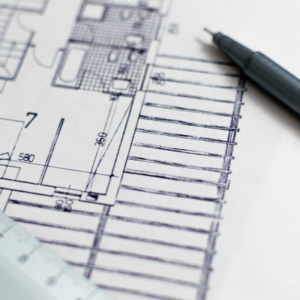The Step-by-Step Property Development Guide For 2022
Making money from property investment probably isn’t new to you, however, property development offers another avenue of generating large profits. Developing a block of land or buildings may seem like a reliable way to build wealth. But the reality is that it involves a great amount of risk and work to get there. Therefore, understanding the wide range of activities and processes involved will put you in the best place for minimising risk and maximising profits. From site evaluation to construction, this article will give you the step-by-step property development guide to use in 2022.
What is Property Development?
Before we delve into the step-by-step guide, it is important to first clarify what property development is. Property development, sometimes referred to as real estate development, is the process of developing buildings or land into a higher use-value. In property development, the developer is able to directly adjust the value of the asset instead of depending entirely on market forces to drive profit. Without a doubt, a strong market will certainly boost profits, though in a declining market property development is generally still profitable.
Property development is a business comprised of multiple elements, including:
- buying land and building property on it;
- renovating an existing property;
- converting the property from one function to another.
The 4 Key Stages of a Property Development Project
This property development guide has compiled the four key stages of property development. However, it is important to note that this is not a linear process. The key phases will often vary from project to project. Therefore, property developers should have the capacity to make changes to the process throughout.
1. Pre-Purchase
The pre-purchase stage is arguably the most intensive step in the development process. It involves a significant amount of time researching and evaluating development sites. To gain a thorough understanding of this stage, we will break it down into further steps, including:
- Researching and evaluating sites: this is the stage where the developer locates the development site through a comprehensive due diligence process. When choosing a site, it is beneficial to use indicators such as population growth, flood and fire risk, nearby public infrastructure and amenities, and school zones. These factors will influence which locations are likely to grow in price and thus yield a high profit when developed.
- Secure funding: before purchasing your development project, you will need to have established how you intend to manage all associated costs and thus how much a bank is willing to lend. Your loan request should include a feasibility report to show that you have accounted for all contingencies. It’s important to remember that banks will consider the track record of the people behind the development, not just the security of the project.
2. Feasibility Study and Purchase
This stage of the process will be the most extensive. It requires months of preparation before you are able to see your hard work come to life. To be efficient, it is important to forward plan and be detailed as much as possible.
It is inevitable that you will not have all the information required to conduct a feasibility study of your project. As a result, the following experts should be included in the process of assessing the development project, including:
- A town planning consultant to advise and assess the potential of your development idea and plan
- An architect to design the concept
- Your builder or project manager to determine build costs
- A real estate agent to get estimates of what your end product will sell for
Once you’ve identified that your project is feasible, the next stage is negotiating contracts and making a purchase. You will want to purchase land at a price that allows you to make a commercial profit.
Note: if you don’t have considerable knowledge of the development process, it may be worthwhile engaging a buyer agent to assist in negotiating a better price.

3. Pre-Construction
As a property developer, you will need to formulate a development plan that will give you the highest combined sales price upon completion.
The pre-construction phase will involve working with architects, engineers and town planners to develop town planning drawings that will achieve the most efficient and profitable use of land. It is critical to seek the assistance and/or opinion of a specialist as this will minimise the possibility of Council refusal.
Development Approval
Once you are happy with your final development plan, the next step is to gather all your documents and submit them for approval to the local Council. The documents you will require typically include:
- development design
- development plan
- land survey
- Certificate of Title
- proposed plans for each level/floor
- landscape plans
- waste management plan
- traffic management plan
- environmental assessment e.g. statement of environmental effects
- a schedule of materials
- the estimated construction cost of development
Note: Your submission to the Council will incur a cost. This is dependent on the type of development, the scale of development, and the legislation of the state you are developing in.
If your application is approved, you may receive a simple planning permit, however, where your application has received objections, you will be issued a notice of decision to grant a planning permit. The notice of decision will be effective for 21 days in which objectors will have the opportunity to lodge an appeal against the decision. If this time elapses and no appeal has been lodged then a planning permit is issued. Similarly, sometimes your application will have a set of conditions that need to be met before your final planning permit is issued.
On the other hand, if your application has been refused, you will have 60 days to lodge an appeal against the council’s decision, to the relevant state regulatory body.
Choosing a Builder
Following Council approval, you will need to obtain quotes from builders. With so many builders out there, this step of pre-construction can be quite difficult. You will want to obtain multiple quotes from builders and look for evidence that the builder will be able to execute the type of project that you are intending. You can gain a better understanding of this by looking through their previous projects.
4. Construction
Once you have signed a builder’s contract and construction has commenced, you will need to begin paying builders. Typically, property developers will pay builders in instalments at the completion of each stage. One way to break down payments is the initial deposit, several progress construction payments then the final balance on completion. Not only will this allow you to assess the work is progressing in accordance with plans, but it will also prevent builders from abandoning the project once they have been paid.
If you’re looking to get the best value out of your investment, having an exit strategy from the beginning is key. This means knowing why you’re developing this land and what you’re hoping to achieve from its completion. For example, you may decide to make a profit by selling the development or building up a portfolio of rental assets for yourself. In addition, you should identify how much similar properties have sold for in the local market and/or the likely demand and yields for your development project. If you have done your due diligence and planning beforehand, then it should be fairly easy to define an exit strategy that maximises profits.
Typically there are two options to deal with the property development once completed:
- Sell the newly built development for profit, or
- retain the development as an investment property.
Note: this will be highly dependent on the current market and demand.
Is property development worth it?
Well, it is a lot of work. But if you’re willing to put in the work, it is definitely a rewarding venture. By following this property development guide you can ensure you are not missing any crucial steps. Knowing your market, having a skilled manager, and performing due diligence are all important aspects of property development. You’ll be more likely to succeed if you’re willing to learn and committed to seeing your project through to completion.
This property development guide has hopefully equipped you with the knowledge to take advantage of the lucrative benefits of property development. You may be missing out on critical opportunities by waiting for the property market to stabilise. This is where property development can drive profits even in a declining market.
PiPr is home to builders and property developers. See what PiPr has to offer here or contact us here, we’re always happy to have a chat.

